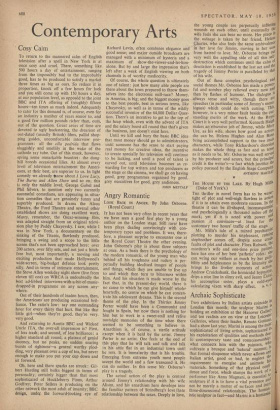Angry Romantic
LOOK BACK IN ANGER, By John Osborne. (Royal Court.)
IT has not been very often in recent years that we have seen a good first play by a young author on the London stage. Still rarer have been plays dealing convincingly with con- temporary types and problems. It was, there- fore, a pleasant surprise to encounter one at the Royal Court Theatre the other evening. John Osborne's play is about three subjects at once. As a basis there is the psychology of the modern romantic, of the young man who behind all his toughness and rudery is per- petually building idealised images of people and things, which they are unable to live up to and which then turn to bitterness within him. And his situation is made worse by the fact that, in the present-day world, there is no cause to which he can give himself whole- heartedly, no centre on which he can concen- trate his adolescent dreams. This is the second theme of the play. In the Thirties Jimmy Porter would have been a Communist and fought in Spain, but now there is nothing for him but to work in a sweet-stall and relive nostalgic memories of the time when there seemed to be something to believe in Anarchism is, of course, a sterile attitude except when it is held by the artist. Jimmy Porter is no artist. One feels at the end of this play that he will talk and talk and talk in his attic flat in an industrial town until he rots. It is immaturity that is his trouble. Emerging from extreme youth most people accept the world and a few transcend it. He can do neither. In this sense Mr. Osborne'c play is a tragedy.
The actual action of the play is centred around Jimmy's relationship with his wife Alison, and his anarchism here develops into the familiar pattern of Strindberg's love/hate relationship between the sexes. Deeply in love,
the young couple are perpetually inflicti: g wounds on each other, until eventually tile wife feels she can bear no more. Her place it the menage is taken by her friend, HelCtlJ Charles, who also feels the same ambivalen e in her love for Jimmy, moving in her case from hatred to love. Mr. Osborne brings OUI very well the appalling side of all this self destruction which continues until the calm et desolation is established in the last act and the tragedy of Jimmy Porter is paralleled by that of his wife. Out of these complex psychological arri social themes Mr. Osborne has made a power* ful and sombre play relieved every now aid then by flashes of humour. The dialogue ii always tense and witty, though there are speeches (in particulat some of Jimmy's moan' logues) which could do with cutting. This' however, is a very minor fault beside the nut' standing merits of the work. At the RnYal Court it is very well performed. Kenneth Haigh makes an obsessive job of Jimmy, while Mary Ure, as his wife, shows how good an actre s she can be. Helena Hughes and Alan Batts bring accomplished support to the two nrill characters, while Tony Richardson's direction makes the whole thing as fast and as teree as it needs to be. Mr. Osborne was well served' by his producer and actors, but the prinelO credit is the writer's—a fact which justifies ille policy pursued by the English Stage ComPan:'
ANTHONY HART
I-


































 Previous page
Previous page